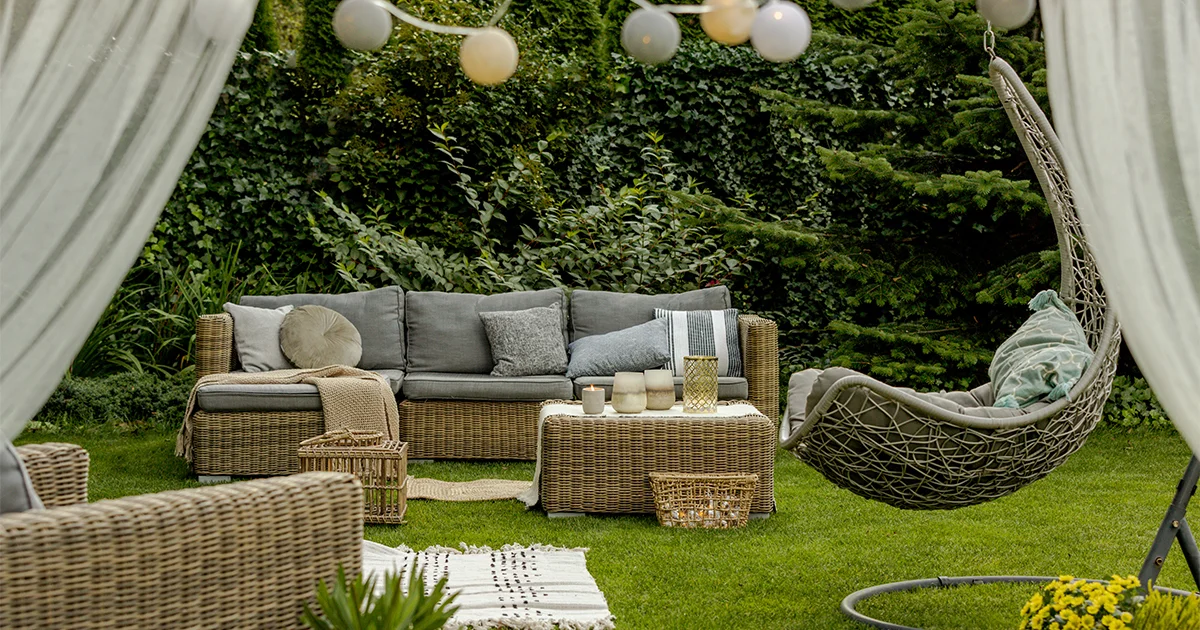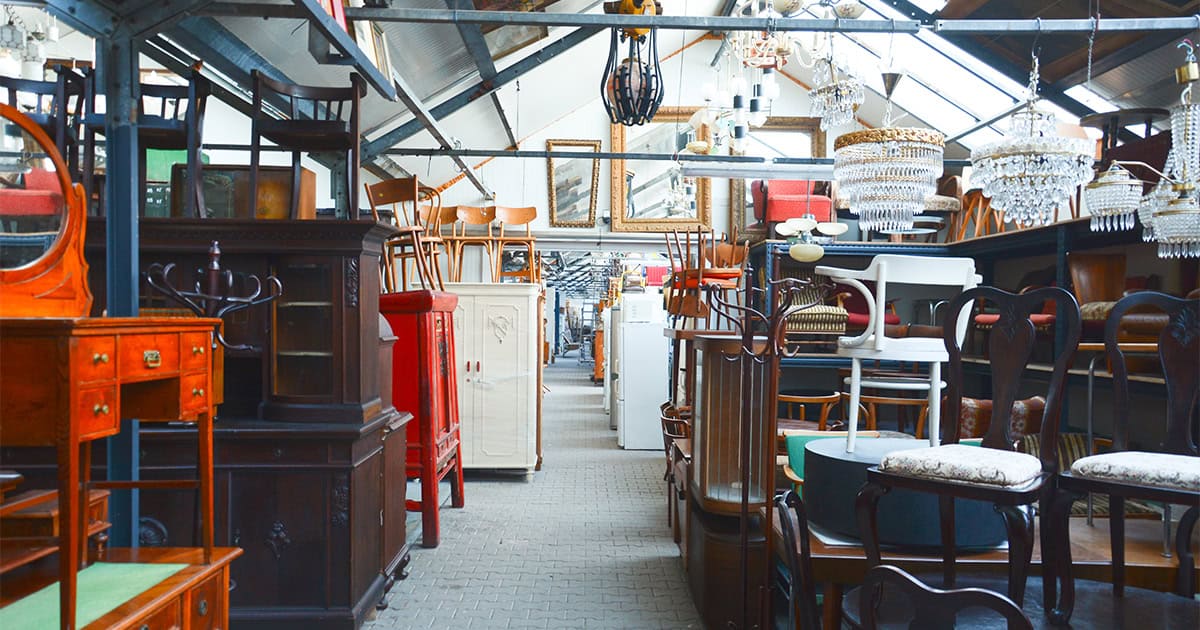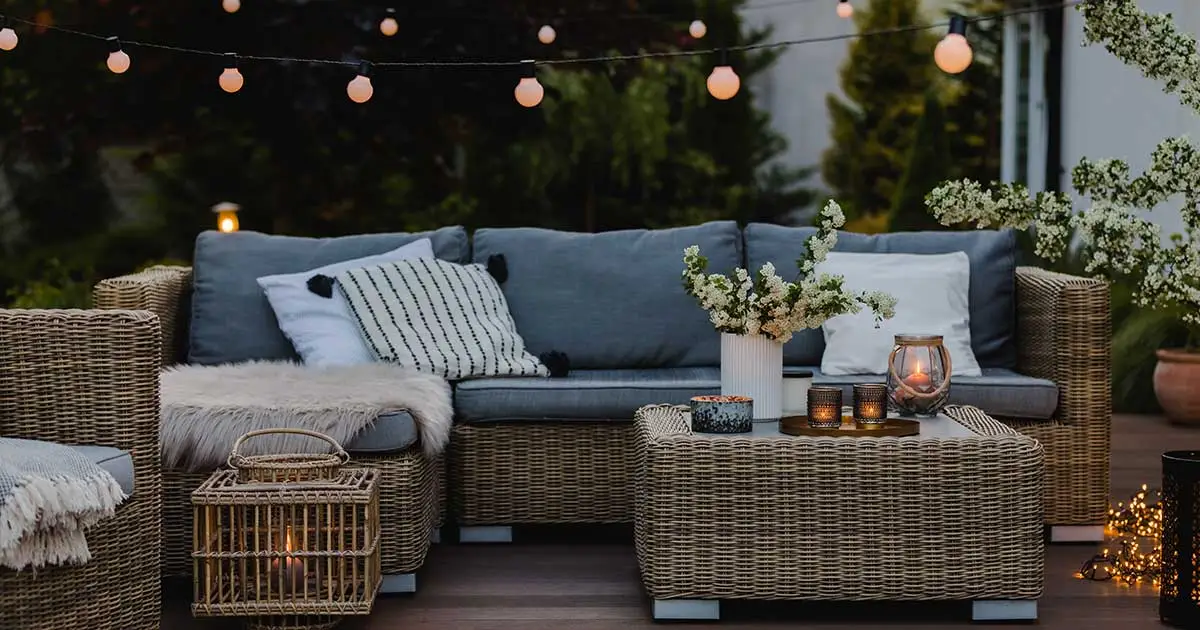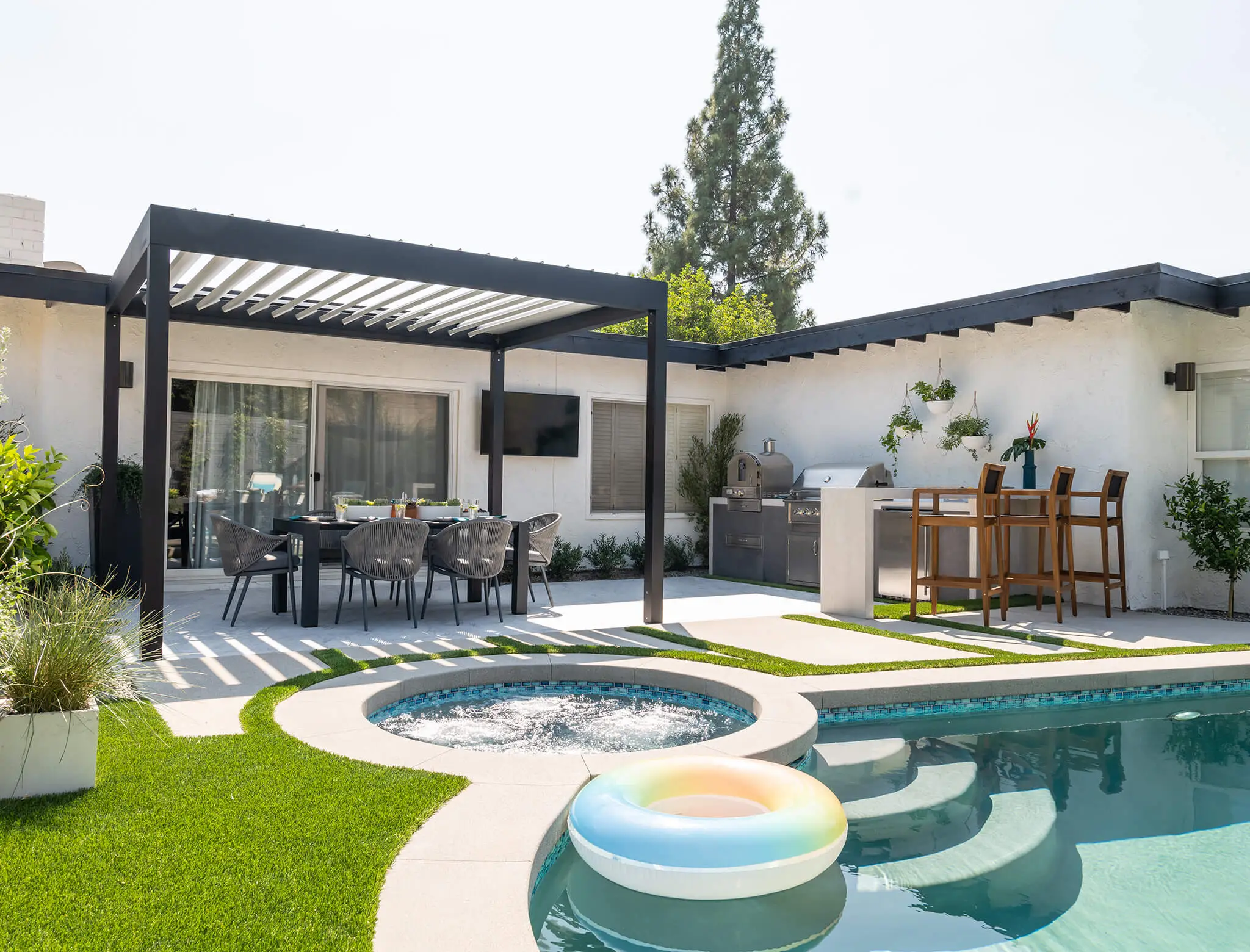The Property Brothers Glossary of Design Terms

This site contains affiliate links to products. We may receive commission for purchases made through these links. Price at time of publish date may change.
Looking to expand your knowledge of design terms? Here’s a helpful list of our commonly uttered words and phrases, from abstract to zigzag.
A
abstract: a design style that uses general forms rather than detailed realistic representations
accent colors: contrasting colors, often used to enhance a room’s size, shape, or color scheme
accessories: small decorative objects such as books, plants, vases, and lamps
ambient lighting: lighting that provides overall, even illumination for a room or space
Americana: objects and decor items that are characteristic of American history or culture
apron sink: a large sink with with an exposed front-facing side, originally designed to hold a lot of water; also called a farmhouse sink
Art Deco: a streamlined, geometric style of home furnishings and architecture popular in the 1920s and 1930s; characteristics include rounded fronts, wood furniture with chrome hardware, and glass tops. It’s also inspired one of our favorite fabric collections!
artisan: a style characterized by fine, but not overly ornate, workmanship that celebrates the makers community identity or ethnicity
asbestos: an insulating material used in many homes built before 1980 that is now considered dangerous to the lungs
B
backsplash: a panel behind behind a sink or stove designed to protect the wall from splashes or spills
balance: the design principle of arranging objects in a way that evokes a pleasant, welcoming feel
banquette: a long upholstered seat, settee, or bench that’s usually built-in; this term also refers to the ledge at the back of a buffet
baroque: a highly ornate decorative style that originated in Italy in the 1600s and is characterized by irregular curves, twisted columns, elaborate scrolls, and oversize moldings
beveled edge: a slanted and polished edge finishing detail used on wood, marble, glass, etc.
bungalow: a small, low house or cottage that usually consists of a single story
C
calico: cotton or cotton-blend fabric printed with small, colorful patterns
chic: haute design elements that are in style and on trend
cane chair: chairs that were first made in England and very popular since they were cheap, light, and durable; they were first used in America in the late 1600s
canopy bed: a bed supported by four tall posts with a cross members joining the posts that may be used for a supporting a fabric canopy cover, swags, curtains, etc.
canted: sloping at an angle, such as a sofa or chair back
casting: the method of forming metal objects by pouring molten metal into a mold and allowing it to harden
centerpiece: an ornament used to occupy the center of a dining table
channeling: a grooved or creased effect in wood
chevron: a V-shaped pattern often found in tile and flooring; also called zigzag
Chippendale: a design style that includes cabriole legs, ball and claw feet, and highboys with broken pediment tops
cladding: the covering or coating of a structure with another material—we often use it to make a wall or structural beam more aesthetically pleasing
country: a design casual style that gained popularity in the 1980s and remains popular today; often features nature and nostalgic motifs as well as handcrafting and distressing
Craftsman home: an architectural style of home that typically has a covered front porch, tapered columns that support an overhanging roof, and pillars lining the entry
curb appeal: the attractiveness of the exterior of a property
D
dinette: a small dining set, often used in the kitchen
distressed (or distressing): a furniture trait where pieces are purposely dented or otherwise marked to render an antique, rustic, or country-style appearance
drop seat: a concave seat where the middle and front are lower than the side
drywall: a low-cost construction material used to create walls and ceilings; also known as gypsum board
Dutch dresser: a cabinet with open shelves on the upper portion and drawers or a cupboard below
E
Eames chair: a classic chair style designed as modern take on the nineteenth-century club chair
eat-in kitchen: a kitchen designed to allow for both food prep and eating
eclectic: a marriage of various design aesthetics
Edison bulb: any carbon- or early tungsten-filament lamps (or modern bulb reproducing their appearance); also called an antique filament bulb
elevated: something that’s kicked up a notch or taken to another level in style or design
eggshell: an oil-based paint that has a low-sheen satin finish; works well in high-traffic areas
embossing: a technique to impress or stamp a design onto a piece of furniture; mostly used on wood pieces to resemble carving
emulsion: a water-based paint that’s mainly applied to walls and ceilings
ergonomic: relating to furniture design and function for the human form; commonly found in home office furnishings, such as chairs
étagère: a freestanding set of open shelves commonly used for displaying accessories; also, a small work table consisting usually of shelves or tray sets one above the other
F
fanlight: a window, usually semi-circular, with radiating glass sections that make it look like an open fan, commonly found above doors
faux: a simulation of something else, like faux marble as a marble-like surface painted onto walls or other surfaces
feng shui: the concept of crafting a welcoming, functional space with good energy; it is the mindfulness of place, noticing all the details in your environment with gratitude and care
finish: the surface coating of an item, which can include paints, stains, varnishes, and fabric treatments; wood, metal, fabric, stone, and many other materials require a finish for reasons such as coloring, texture, and protection from moisture
Finnish style: Finnish furniture designers used bent and laminated (layers of solid wood) woods to create organic, humanistic forms and lightweight open shapes
firmness: a sought-after quality by many in upholstered furniture and mattresses, which is usually interpreted to mean support
floor plan: a diagram, usually to scale, showing a view from above of the relationships between rooms, spaces, and other physical features at one level of a structure; they often include details of fixtures like sinks, water heaters, and furnaces
focal point: an area to which the eye is drawn; this could be a part of a room, a view, landscaping, etc.
French doors: a set of doors of light construction with glass panes extending for most of their length
functionalism: a form of design based on use rather than on ornamentation
G
garland: an architectural ornamentation representing foliage, flowers, or fruits plaited and tied together with ribbons
gilding: a coating with a thin layer of gold or gold-like substance
glaze: a coloring technique used in the finishing process of furniture to highlight the grain characteristics of wood or to give a high sheen to leather
Gothic: pieces from this period (late 1100s to early 1500s) were large with straight lines and very heavy in weight and scale
grout: a thin mortar used for filling spaces such as between tile and bricks
H
halogen: a light that emits true color characteristics; unlike fluorescent and other lighting that tend to give a room a yellowish cast, halogen’s light remains neutral
hardwood: wood derived from trees such as oak, beech, maple, mahogany, and walnut
headboard: an upright structure rising above the mattress at the head of the bed
hearth: the floor or area in front of a fireplace
herringbone: a distinctive V-shaped weaving pattern commonly used in flooring and tiling
highlighting: a color-removal technique in the finishing process, which is used to highlight natural grain characteristics
hood: a shaped top on cabinet work that usually overhangs the vertical lines
hue: a color tone such as red, green, yellow, or blue
hutch: an enclosed cupboard with shelves resting on a solid base such as buffet or desk
hygge: a Danish-inspired design trend focusing on coziness, warmth, relaxation, and homey-ness
I
inlay: decorative patterns created with pieces of different woods or other materials, which have been set into the surface of wood furniture
inset tile: tile with a different design than the surrounding body of tiles
inspired: the idea of harmony in a design scheme; the inspired home works cohesively as a whole rather than through a piecemeal approach
inverted living: a design trend in which a home’s bedrooms are downstairs and the kitchen and living room are on the first or second floor
J
jewelry armoire: a small and narrow upright chest for the storage of jewelry and fashion accessories
K
kick pleat: an inverted pleat that’s usually found at the corner of a flat or box-pleated skirt on a piece of upholstered furniture
kiln-dried: wood that’s dried by a means of controlled heat and humidity in kilns or ovens to specific ranges of moisture content
kitchen work triangle: a concept used to determine the most efficient kitchen layout for a design, usually consisting of the cooktop, the sink, and the refrigerator
knit: a type of upholstery fabric that is made from polyester or nylon; it is knitted as opposed to woven and is softer and stretchier than other fabrics
knot: the area where a branch or the limb of a tree appears on the face or edge of a piece, such as knots commonly found in knotty pine furniture
L
ladder-back: a country style of chair with a back that resembles a ladder
laminate: any thin material such as wood or plastic that’s glued to the exterior of a cabinet or other surface
lattice: an openwork decoration of crisscrossed wood, iron plate bars, etc. in a diagonal or square pattern
Lawson: an overstuffed furniture style that has square seat cushions, short square or rectangular backrests, and high rolled or squared arms; variations are often referred to as transitional
layered: building interest through various levels of elements or a combination of many different textures and patterns together
lazy Susan: a revolving tray or stand, normally made of wood or metal
linoleum: an all-natural flooring material made of linseed oil, cork dust, wood flour, tree resin, ground limestone, and pigments
live edge: a furniture trend in which the natural edge of the wood under the bark is incorporated into the design of the piece
living wall: a vertical, eco-friendly design installation comprising different types of plants or other greenery
M
mantel: the shelf above a fireplace; the term is also commonly used to refer to the decorative trim around a fireplace opening
marbleizing (or marbling): decorative painting or finishing of a surface that is marble-like in appearance
matte finish: a finish that’s more flat than shiny
millwork: construction materials that are produced at a woodmill
modern (or moderne or modernist): a clean, streamlined furniture style of 20th Century with roots in the German Bauhaus School of design and Scandinavian design; sometimes referred to as “international style”
modular: furniture units that can be rearranged or stacked in different configurations
molding: ornamental shaped strips that are applied to and project from a surface
monochrome: a single hue
mosaic: colorful natural stone tiles, usually sold in squares
motif: a decorative theme, component, or element
N
natural finish: a transparent finish that doesn’t seriously alter the original grain or color of the natural wood; they’re usually applied with oils, varnishes, and/or similar materials
Neo-Classic: a design style that’s elegant and simple, with motifs borrowed from ancient Rome and Greece
nesting tables: tables of varying sizes stored one under the other, normally consisting of a set of three
neutral color: colors such as white, black, gray, and tan that easily blend with other colors
niche: a recess in a wall for displaying a sculpture or other accessory
O
onlay: an ornament applied to the surface of wood or other materials
opaque: any material that does not allow light to pass through (i.e., non-transparent)
open concept: an interior design style that eliminates most walls to combine common areas like the kitchen, living room, and dining room into a single great room
ottoman: a low, often upholstered footstool or seat without arms or a back
P
parquet: wood flooring that’s usually laid in blocks with boards at angles to each other to form decorative patterns
pastel: a light, soft color
pencil pleat: a tightly gathered drapery heading
plush: fabric in a velvet weave with a long pile
plywood: a trusty construction material consisting of sheets of wood glued or cemented together
pop: a design style developed in the 1950s and 1960s that draws inspiration from commercial art such as product packaging and comic strips
Post-Modernism: a reaction against Modernism that began during the 1950s and promoted the reintroduction of bright colors and decorative components to furniture- and decor-related designs
primary colors: the three colors that cannot be produced from any other color: red, yellow and blue
Q
quirk: a narrow groove that separates a bead or molding from the others
R
rake: the angle or slant of a chair back or non-vertical furniture leg
rattan: a type of climbing palm with very long and tough stems that are often used in wickerwork
rayon: a synthetic fiber that’s derived from the cell wall of plants and noted for its rich luster, pilling resistance, and absorption of dye colorings
ready-made: standard-sized draperies that are factory-made
receding colors: colors that appear more distant, such as blue, gray, or bluish-greens
reproduction: new furniture that’s a copy of an antique style or period
retro: a style featuring contemporary reinterpretation of some of the best-loved furniture looks from the 1930s to 1980s; the vibe of these pieces is often playful and/or ironic
revival: a reproduction of classic American furniture styles from the 1700s (although not always accurate in detail); these pieces were popular from the late 1800s through the early 1900s
Roman shade: a tailored fabric window shade that folds sideways
ruching: a narrow gathered or pleated strip of decorative fabric
S
saddle seat: a wooden chair seat which has been hollowed to the sides and back to resemble the pommel of a saddle
sateen: a cotton fabric that’s made to mimic satin with a smooth silky finish on one side
sauvage: a two-toned or contrasting color effect applied to leather furniture
scale: the size of an object, or comparisons between a drawing size and the actual size of a piece
scallop: a curved case piece ornamentation, commonly in the shape of a scallop shell
Scandinavian: a simple, clean, and lightweight design style with a focus on function
sconce: a light fixture that attaches to a wall and is commonly tall and narrow
sectional: a type of sofa that is divided in several parts, which provides ample seating and ease of rearranging
shiplap: a style of wooden wall siding characterized by long planks that are mounted horizontally with a slight gap between them
shutter: a louvered or flush wood or vinyl frame in the shape of a door placed at each side of a window
soft close: a type of self-close drawers or cabinets that have a gentle closing effect due to special slides
spindle: a slender turned and shaped column, often arranged in rows and used in a staircase or chair back
squab cushion: a loose, flat cushion on the seat of a chair
striated: the long, thin lines or streaks running through design materials like marble or flooring
suite: a complete matched set of furniture, such as a bedroom suite
symmetrical: a formal, mirror-image balance in design or decorating
T
tailored upholstery: a furniture frame that has fabric fitted and permanently attached
tallboy: a tall chest with a larger chest of drawers that supports a slightly smaller chest
tapered leg: a leg that becomes incrementally smaller towards the bottom
tapestry: traditionally a heavy woven fabric featuring decorative designs or pictures to be hung on a wall; today, the term commonly refers to highly decorative fabrics with a woven design
task lighting: lighting targeted to a particular area of a room for a specific function
thread count: the number of horizontal and vertical threads per square inch in a bedsheet; the higher the number, the softer the sheet
throw pillow: a small, decorative pillow usually placed on a bed, couch, or armchair
traditional: a style of design that is traditional and comfortable
transitional: a style of design that blends influences from various style categories
trim: decorative elements such as fringe on an accent pillow or moldings on a bookcase
trundle bed: a low bed that can be rolled under another bed for storage when not in use
U
under-drapery: a lightweight, usually a sheer drapery that hangs behind the heavier over-drapery
upholstery: Furniture such as sofas and chairs covered in fabric, vinyl, leather, or other materials
V
valance: a horizontal feature used as a header for draperies, which can be made of fabric, wood, metal, or other materials
vanity: the countertop and cabinet used to support a sink in a bathroom
velvet: a luxurious fabric that is soft in texture and features a short, thick pile
veneer: thin sheets of wood applied to a furniture surface to create decorative inlay patterns of wood grain
venetian blind: a window treatment consisting of a series of horizontal slats that can be turned or raised to control light or privacy
Victorian: a furniture style named after England’s Queen Victoria that was very popular through the latter half of the 1800s; it was usually constructed of mahogany, walnut, and rosewood in dark finishes, which were often highlighted with elaborate carved floral designs
W
wainscoting: an application of wood molding up to the middle or lower half of a wall
wicker: made from woven materials such as willow, reed, or rattan
writing desk: a small desk or table commonly used for personal use such as writing letters or paying bills
Z
zigzag: a molding or stitching with a series of frequent sharp turns from side to side



